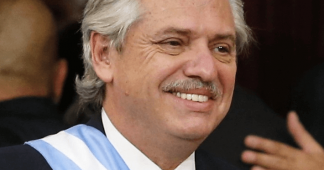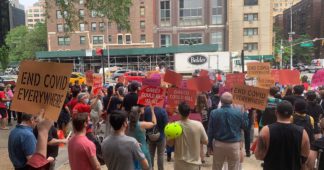“The divide between the haves and have-nots will only grow larger if manufacturers and leaders prioritize booster shots over supply to low- and middle-income countries.”
By Jake Johnson
As the Biden administration announced Wednesday that the U.S. will begin administering coronavirus vaccine boosters next month, the World Health Organization slammed rich countries for prioritizing third shots for their populations while billions of people across the world still lack access to a single dose.
Top officials at the U.S. Department of Health and Human Services said in a joint statement that, beginning the week of September 20, “all Americans” who received either the Pfizer or Moderna vaccine will be offered a booster starting eight months after their second dose.
Citing recent studies indicating that antibody levels may wane more than six months after the second vaccine dose, the U.S. officials argued that “a booster shot will be needed to maximize vaccine-induced protection and prolong its durability.”
“Our top priority remains staying ahead of the virus and protecting the American people from Covid-19 with safe, effective, and long-lasting vaccines,” the statement reads. “We also want to emphasize the ongoing urgency of vaccinating the unvaccinated in the U.S. and around the world. We will continue to ramp up efforts to increase vaccinations here at home and… expand our efforts to increase the supply of vaccines for other countries, building further on the more than 600 million doses we have already committed to donate globally.”
Last week, the Food and Drug Administration (FDA) authorized a third vaccine dose for certain immunocompromised individuals—such as people who have received solid organ transplants—but the agency has yet to approve boosters for the rest of the U.S. public.
At around the same time the U.S. officials announced the imminent booster rollout—which is contingent on FDA approval—the head of the WHO delivered a speech condemning wealthy countries for pursuing “narrow nationalistic goals when we live in an interconnected world and the virus is mutating quickly.”
“The divide between the haves and have-nots will only grow larger if manufacturers and leaders prioritize booster shots over supply to low- and middle-income countries,” WHO Director-General Dr. Tedros Adhanom Ghebreyesus said, without specifically mentioning the U.S. “In fact, strong national leadership would be to fully commit to vaccine equity and global solidarity, which would save lives and slow variants down.”
“Vaccine injustice,” Tedros added, “is a shame on all humanity.”
Dr. Mike Ryan, director of the WHO’s Health Emergencies Program, argued Wednesday that rich nations administering booster shots is akin to “planning to hand out extra life jackets to people who already have life jackets and leaving other people to drown without a life jacket.”
“That’s the ethical reality,” said Ryan
The US, Germany, the UK and others are leaving people to drown without a life jacket.
That's a choice.
End #VaccineApartheid
Support a #PeoplesVaccine for everyone https://t.co/jPQqKcXVh1— The People's Vaccine (@peoplesvaccine) August 18, 2021
Earlier this month, Tedros called for a temporary moratorium on vaccine boosters, a demand aimed at freeing up supply for the dozens of low-income nations that have vaccinated less than 10% of their populations.
But the U.S., Germany, and other wealthy countries currently moving forward with booster campaigns were quick to dismiss the WHO chief’s call for a moratorium, pointing to their relatively meager vaccine donations as evidence that they’re taking sufficient action to close the inoculation gap between rich and poor nations.
Many of the countries currently moving ahead with booster shots—including Germany and the United Kingdom—are simultaneously blocking an effort to suspend vaccine-related patent protections in order to scale up global production.
“Dear Americans: Imagining that a booster shot will protect us from a pandemic that continues to rage around the world is more theater than public health,” said Matthew Kavanagh, a professor of global health at Georgetown University. “Ending the pandemic is far better medicine than an individual booster.”
Madhu Pai, a Canada research chair in epidemiology and global health at McGill University in Montreal, echoed that argument, tweeting, “The ‘race to stop the Delta variant’ cannot be won by giving repeated boosters to already vaccinated people in a few rich nations.”
“The race will be won when all people in the world have access to vaccines,” Pai added.
According to the latest figures from Our World in Data, just 1.3% of people in low-income countries have received at least one vaccine dose, meaning billions of people remain vulnerable to the highly contagious Delta variant and other mutations.
Africa, Southeast Asia, and other regions of the world are currently facing alarming surges in coronavirus cases and deaths as they struggle to obtain access to vaccines due to supply shortages.
“Due to the massive global Covid-19 vaccine shortage, less than 4% of people on the African continent and just 30% of people across Asia have obtained at least one dose of a vaccine, compared with 60% of Americans,” Public Citizen, a U.S.-based consumer advocacy group, noted in a report published Monday. “More than 4.3 million people have died from Covid-19 so far. In recent days, scientists have rung the alarm to warn that without immediate action to vaccinate the rest of the world, new variants may emerge—including ones that may evade vaccines’ protection.”
In an editorial on Tuesday, Nature endorsed the WHO’s call for a temporary moratorium on booster shots, arguing that “the case for boosters has not yet been proved.”
“In a period of vaccine scarcity, the choice to dole out boosters must be guided by evidence of benefit, and consideration given to the cost of delaying the delivery of vaccines to vulnerable people and health-care workers in other countries,” the editorial reads. “So far, there is little evidence that boosters are needed to protect the fully vaccinated.”
“If vaccines were not scarce, boosters would be less controversial,” the editorial continued. “But to focus on boosters when more than half the world lacks vaccine doses is short-sighted and will only keep the pandemic burning longer. For wealthy countries, this strategy means they will be indefinitely chasing their tails in terms of new variants. And for the rest of the world, it means prolonging unnecessary suffering.”
Published at www.commondreams.org










